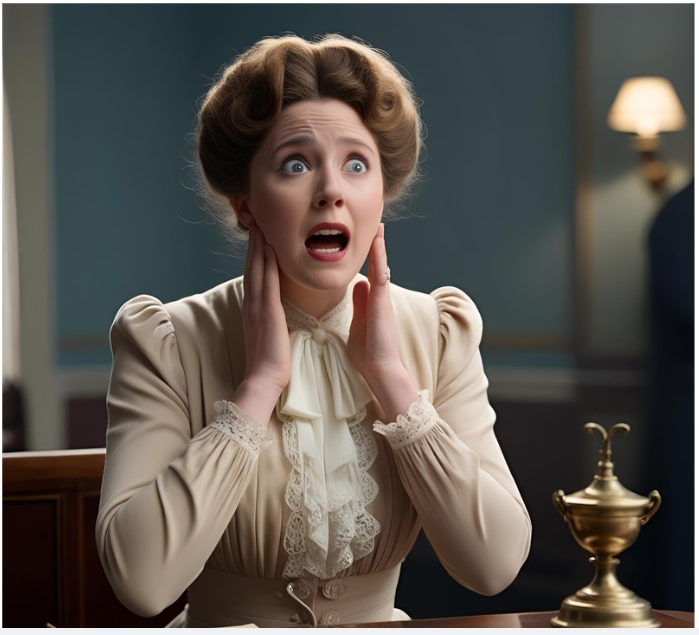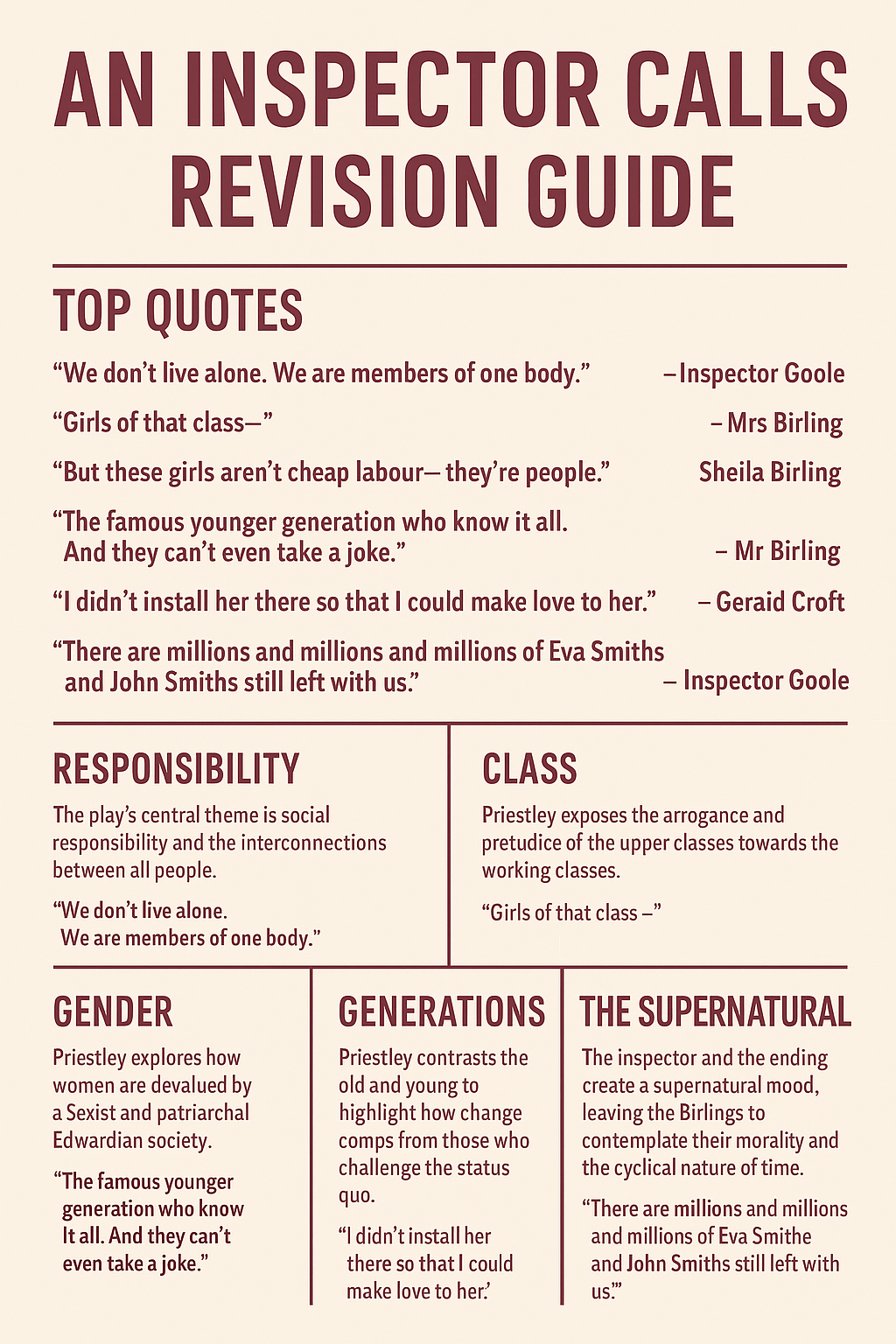Achieving Grade 9 in English Literature
Achieving Grade 9 in English Literature: Key Quotes and Themes in An Inspector Calls
An Inspector Calls, written by J.B. Priestley in 1945 but set in 1912, is a morality play and a political commentary that critiques Edwardian society. Priestley uses the characters, structure, and dramatic devices to explore themes of responsibility, class, gender, generational conflict, and time. To achieve a Grade 9, students must move beyond simple plot summary or character description. You need to analyse language, link quotes to broader ideas, and discuss Priestley’s intentions and the play’s context.
This essay will guide you through some of the top quotes, the major themes, and the exam techniques that help secure the highest marks.
1. Responsibility – The Central Theme
The most important theme in the play is social responsibility: the idea that everyone is part of a community and must care for one another. Priestley believed in socialism and wanted his audience to realise the dangers of selfishness and capitalism.
Key Quote:
“We don’t live alone. We are members of one body.” – Inspector Goole
Grade 9 Analysis:
This quote is the moral message of the play. The metaphor “members of one body” draws on Christian imagery, suggesting unity and mutual care. The Inspector acts almost like a priest, delivering a sermon. Priestley uses this to show that morality and social duty are more important than wealth or class.
You can link this quote to the structure of the play. It comes before the Inspector leaves, acting as his final warning. A Grade 9 student would notice how the Inspector represents Priestley’s own voice and that his name, “Goole,” sounds like “ghoul” – a supernatural being – perhaps hinting he is not real but a conscience or a moral force.
2. Class Divide and Inequality
Class is a constant undercurrent throughout the play. The Birlings are upper-middle class, while Eva Smith represents the working class. Priestley uses the contrast between them to expose the cruelty of the class system.
Key Quote:
“Girls of that class—” – Mrs Birling
Grade 9 Analysis:
The word “that” is loaded with prejudice and contempt. It shows Mrs Birling dehumanises Eva and sees her as morally inferior just because she is working class. The dash indicates her hesitation, as if struggling to even say the word, which reveals how deeply ingrained her snobbery is.
Priestley criticises this classism by showing that Eva is morally superior to the Birlings, despite her poverty. A Grade 9 student might also link this to the context: in 1912, class determined everything, but by 1945, Britain was beginning to question such divisions.
3. Gender Roles and Expectations
Priestley also critiques the way women were treated in Edwardian society. Women were expected to be submissive, domestic, and dependent on men. Eva Smith suffers multiple forms of gendered oppression, while Sheila is used to explore the potential for change.
Key Quote:
“But these girls aren’t cheap labour – they’re people.” – Sheila Birling
Grade 9 Analysis:
Sheila’s line shows a significant development in her character. At the start, she is shallow and materialistic, but as the play progresses, she becomes more aware of the world and her responsibility. The word “cheap” links class and gender – Eva is devalued both as a woman and a worker.
Priestley presents Sheila as a symbol of hope. A strong answer would comment on how Sheila reflects Priestley’s optimism that the younger generation can change. In contrast, her parents refuse to take responsibility, showing how entrenched views are harder to shift.
4. Generational Divide

One of the most important contrasts in the play is between the older and younger characters. Mr and Mrs Birling represent the traditional, capitalist mindset, while Sheila and Eric are more open to Priestley’s socialist ideas.
Key Quote:
“The famous younger generation who know it all. And they can’t even take a joke.” – Mr Birling
Grade 9 Analysis:
Birling’s sarcasm and dismissive tone here shows his refusal to learn. He mocks the younger generation, but the irony is that they are the only ones who seem to change. Priestley uses this to highlight that real progress depends on young people rejecting the old ways.
This is where dramatic irony also plays a role. Mr Birling is constantly shown to be wrong – about the Titanic, about war, about his belief that “a man has to mind his own business.” Priestley uses him as a symbol of ignorance and capitalist arrogance.
5. Power and Abuse
Throughout the play, Priestley shows how those in power – whether through wealth, gender, or position – abuse those who are vulnerable. Each character’s treatment of Eva reveals something about how society misuses power.
Key Quote:
“I didn’t install her there so that I could make love to her.” – Gerald Croft
Grade 9 Analysis:
This quote is filled with euphemism and self-justification. “Install her” makes Daisy sound like furniture, not a person. Gerald’s phrasing shows how he tries to deny his exploitation. Priestley wants the audience to see that even those who believe they’re being kind can still be exploiters.
Gerald is not portrayed as purely evil, but he represents the hypocrisy of the upper class – charming and polite, but unwilling to face moral truth. A top-grade student might note how Gerald tries to “clear” his name by proving the Inspector wasn’t real, showing he’s more concerned with appearances than change.
6. The Supernatural and Time
There is a strange, almost supernatural quality to the Inspector, especially with the ending. He seems to know things before they happen, and the play ends with a mysterious phone call announcing that a real inspector is on the way.
Key Quote:
“There are millions and millions and millions of Eva Smiths and John Smiths still left with us.” – Inspector Goole
Grade 9 Analysis:
The repetition of “millions” emphasises the scale of suffering in society. “Eva” and “John Smith” are common names, symbolising the anonymous masses who suffer in silence. The Inspector is reminding the characters – and the audience – that Eva’s story is not unique.
This quote also helps explore the idea of timeless morality. Even though the Inspector may not be “real,” his message transcends time. Priestley seems to be saying that social justice is always relevant. You could also explore how the play’s structure (a closed-room drama) makes it feel like a moral fable.
Exam Technique: How to Use These Quotes in Essays
To achieve a Grade 9, it’s not enough to remember quotes. You need to:
Analyse Language and Structure: Focus on word choice, tone, stage directions, and dramatic irony.
Link to Context: Mention 1912 vs 1945, capitalism vs socialism, and Priestley’s own beliefs.
Explore Interpretations: Offer more than one reading of a character or theme.
Use the Writer’s Intentions: Always ask: Why did Priestley include this? What does he want the audience to think or feel?
Use Terminology: Use words like anaphora, symbolism, juxtaposition, allegory, catharsis, and metaphor appropriately.
Sample Paragraph (PEE Chain for Grade 9)
Point: Priestley uses the character of Mr Birling to criticise capitalist arrogance and ignorance.
Evidence: This is seen when Mr Birling declares, “The Titanic – she sails next week – unsinkable, absolutely unsinkable.”
Explanation: The repetition and emphatic adverb “absolutely” emphasise Birling’s overconfidence. However, the audience knows the Titanic did sink, which creates dramatic irony. Priestley uses this technique to undermine Birling’s authority and to show that those in power are often wrong. It also reflects Priestley’s post-war message: trust should not be placed in the old capitalist elite.
Link to context: In 1945, many British people had lived through two world wars. They were disillusioned with the upper classes and more open to socialist ideas. Priestley is urging his audience not to repeat the mistakes of the past.
Conclusion: Priestley’s Enduring Message
In An Inspector Calls, Priestley masterfully uses a single evening in one household to critique the wider injustices of society. Through powerful characters, dramatic structure, and memorable quotes, he argues that everyone is connected, and that real morality means taking responsibility for others.
To achieve a Grade 9, students must interpret quotes deeply, link them to themes and context, and understand how Priestley’s political and moral vision shapes every part of the play. Memorising quotes is only the beginning – real success comes from turning those quotes into sharp, insightful analysis.
REVISION GUIDE


